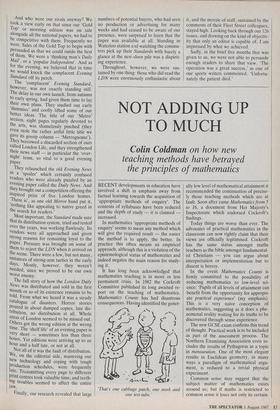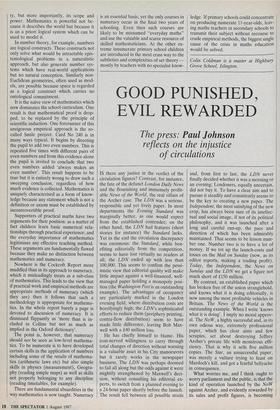NOT ADDING UP TO MUCH
Colin Coldman on how new
teaching methods have betrayed the principles of mathematics
RECENT developments in education have involved a shift in emphasis away from factual learning towards the acquisition of `appropriate methods of enquiry'. The contents of syllabuses have been reduced and the depth of study — it is claimed increased.
In mathematics 'appropriate methods of enquiry' seems to mean any method which will give the required result — the easier the method is to apply, the better. In practice this often means an empirical approach, although this is a violation of the epistemological status of mathematics and indeed negates the main reason for study- ing it.
It has long been acknowledged that mathematics teaching is in more or less permanent crisis. In 1982 the Cockroft Committee published its long awaited re- port on the teaching of mathematics. Mathematics Counts has had disastrous consequences. Having identified the gener- `That's one cabbage patch, one stork and one test-tube.' ally low level of mathematical attainment it recommended the continuation of precise- ly those teaching methods which are at fault. Soon after came Mathematics from 5 to 16, a document from Her Majesty's Inspectorate which endorsed Cockroft's findings. Today things are worse than ever. The advocates of practical mathematics in the classroom can now rightly claim that their views are officially legitimised. Cockroft has the same status amongst maths teachers as the bible amongst fundamental- ist Christians — you can argue about interpretation or implementation but to dissent is heresy.
In the event Mathematics Counts is firmly committed to the possibility of reducing mathematics to low-level sci- ence: 'Pupils of all levels of attainment can benefit from the opportunity for appropri- ate practical experience' (my emphasis). This is a very naive conception of mathematics, suggesting as it does a phe- nomenal reality waiting for its truths to be discovered through sense experience.
The new GCSE exam confirms this trend of thought. Practical work is to be included as part of the assessment process. The Northern Examining Association even in- cludes the results of Pythagoras as a topic in mensuration. One of the most elegant results in Euclidean geometry, in many ways a paradigm of mathematical argu- ment, is reduced to a trivial physical experiment.
Common sense may suggest that the subject matter of mathematics exists around us; but if maths is restricted to common sense it loses not only its certain- ty, but more importantly, its scope and power. Mathematics is powerful not be- cause it describes the world but because it is an a priori logical system which can be used to model it.
In number theory, for example, numbers are logical constructs. These constructs not only solve what would be intractable epis- temological problems in a naturalistic approach, but also generate number sys- tems which have real-world applications but no natural conception. Similarly non- Euclidean geometries, often used as mod- els, are possible because space is regarded as a logical construct which carries no ontological commitment.
It is the naive view of mathematics which now dominates the school curriculum. One result is that mathematical proof is drop- ped, to be replaced by the principle of scientific induction. One forerunner of this unrigorous empirical approach is the so- called Smile project. Card No 240 is in many ways typical. It begins by directing the pupil to add two even numbers. This is repeated five times with different pairs of even numbers and from this evidence alone the pupil is invited to conclude that two even numbers added 'always makes an even number'. This result happens to be true but it is entirely wrong to draw such a sweeping conclusion, regardless of how much evidence is collected. Mathematics is uniquely characterised as a form of know- ledge because any statement which is not a definition or axiom must be established by incontrovertible proof.
Supporters of practical maths have two arguments for their position: as a matter of fact children learn basic numerical rela- tionships through practical experience; and the everyday importance of mathematics legitimises any effective teaching method. These arguments are fundamentally flawed because they make no distinction between mathematics and numeracy.
Nowhere is the Cockroft Report more muddled than in its approach to numeracy, which it misleadingly treats as a sub-class of mathematics. This leads to the view that if practical work and empirical methods are appropriate methods of numeracy (which they are) then it follows that such a methodology is appropriate for mathema- tics. In the whole report barely a page is devoted to discussion of numeracy. It is dismissed flippantly as 'more than is in- cluded in Collins but not as much as implied in the Oxford dictionary'.
The point is, however, that numeracy should not be seen as low-level mathema- tics. To be numerate is to have developed certain skills in the application of numbers including some of the results of mathema- tics (arithmetic laws etc) but also simple skills in physics (measurement), Geogra- phy (reading simple maps) as well as skills not properly belonging to any discipline (reading timetables, for example).
There are fundamental absurdities in the way mathematics is now taught. Numeracy is an essential basis; yet the only courses in numeracy occur in the final two years of schooling. Even then such courses are likely to be misnamed "everyday maths" and use the valuable and scarce resource of skilled mathematicians. At the other ex- treme innumerate primary school children are introduced in the most crass way to the subtleties and complexities of set theory mostly by teachers with no specialist know- ledge. If primary schools could concentrate on producing numerate 11-year-olds, leav- ing maths teachers in secondary schools to transmit their subject without recourse to crude empirical methods, the biggest single cause of the crisis in maths education would be solved.
Colin Coldman is a master at Highbury Grove School, Islington.



















































 Previous page
Previous page